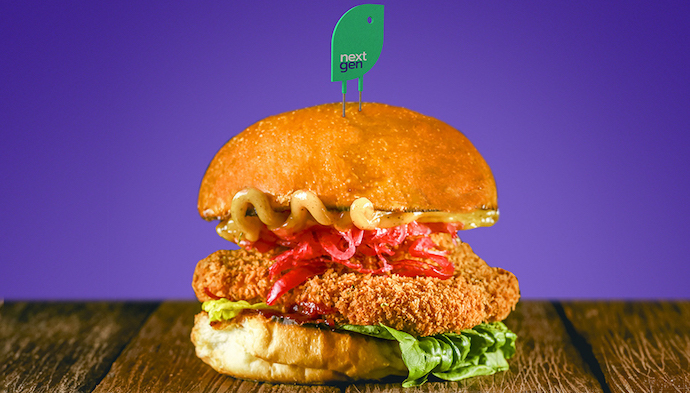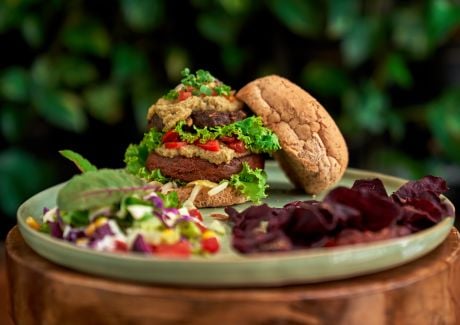
The plant-based chicken steak from Burgreens
Flexitarianism is becoming the new buzzword, globally.
The world is undergoing a food revolution. Many consumers are consciously cutting down on meat consumption and are turning ‘flexitarians’.
Sustainable food products such as plant/cell-based meat, egg, milk and fish are now increasingly finding a place in consumers’ food menus.
The primary reasons for this are the growing sense of sustainability, awareness about unhealthy dietary habits, climate crisis, unsustainable farming and agriculture methods, and a new awakening to clean label foods.
What makes alternative protein substitutes even more attractive is that they offer the same taste and texture as meat products.
With about a 15-17 per cent growth rate, Asia is the fastest-growing alternative food market in the world. Its global market share is projected to grow by 10 per cent by 2029.
Of the US$3.1 billion capital invested to date into the alt food industry globally, about US$230 million went into Asian startups.
In Asia, Southeast Asia has been leading this food revolution. The region has one of the highest economic growth rates in the world, with a very high animal protein consumption. This is where sustainable food companies sniff a tremendous opportunity.
The region indeed is already home to numerous sustainable food startups.
But why is Southeast Asia witnessing great growth? What is attracting global alt food startups and investors into this region?
Let’s start with Singapore.
Singapore
Of all the countries in SEA, Singapore is witnessing the fastest growth. There are already over a dozen big and small alternative food companies, besides a couple of VCs and accelerators.
The names include renowned foreign brands like Beyond Meat, Impossible Foods, and Quorn, and homegrown ones such as Shiok Meats, TurtleTree Labs, Next Gen, Float Foods, OmniMeat, Karana, and Tindle.
“Singapore has long been known as a unique global business hub, and it is now becoming more relevant in the foodtech space, too,” says Andre Menezes, co-founder and COO of Next Gen, a plant-based meat startup.

“In setting up in Singapore, we were attracted by the strong infrastructure to support food technology innovations, especially plant-based foods. We have established our research and development (R&D) centre here. We have access to high-profile investors, multinational partners, and world-class chefs, which enable us to serve the multicultural palates here in Asia and around the globe,” adds Menezes, who started the company in October 2020, along with fellow German Timo Recker.
In February this year, Next Gen closed a US$10 million seed round from a clutch of investors, including Temasek and K3 Ventures.
As he rightly points out, food security, government support for innovative technologies, and highly skilled human resources are some of the major factors drawing alt food startups into the island state.
From a food security standpoint, Singapore’s “30 by 30 goal” highlights the government’s focus on food security and self-sufficiency. The ultimate goal is to produce 30 percent of local nutritional needs locally by 2030.
As for government support, agencies such as the Singapore Food Agency (SFA) and A*STAR have been actively promoting R&D in sustainable food production and future foods.
In 2020, the government launched the Singapore Institute of Food and Biotechnology Innovation (SIFBI) research institute to facilitate R&D and food safety in alternative proteins. It also committed S$144 (US$107) million to invest in alternative protein investment.
“Singapore’s highly skilled human resources and R&D centres help lighten the burden of big capex investment and innovation cost,” says Fengru Lin, co-founder and CEO of TurtleTree Labs. A biotech startup producing milk using cell-based technology, TurtleTree in 2020 raised US$6.2 million from the likes of Green Monday Ventures, Eat Beyond Global, KBW Ventures, and Verso Capital.
The onset of COVID-19 pandemic has also resulted in a major shift in the way we eat.
“Recent and frequent spikes in animal disease transmission have shown that these are no longer one-off occurrences. Current global animal and poultry farming practices are not sustainable. I believe this wave of consciousness for a better solution will drive the industry forward to bigger, brighter outcomes,” according to Vinita Choolani, CEO and founder of Float Foods. A plant-based egg venture, Float Foods last week scored US$1.7 million in an oversubscribed seed funding round, led by Insignia Ventures Partners and DSG Consumer Partners.

TurtleTree Labs co-founders Max Rye and Fengru Lin (R)
“Alternative protein companies will play an important role in Singapore and wider global pursuit for food security, as these novel food solutions are projected to be less resource-consumptive than traditional protein production,” TurtleTree’s Lin goes on.
Thailand
Thailand, a food manufacturing country, has seen an uptick in terms of alternative food products in the recent past.
According to Smith Taweelerdniti, founder of Bangkok-based Let’s Plant Meat, the adoption of plant-based meat products is primarily driven by a belief among Thais that refraining from harming animals is a boon for this life and hereafter.
Also Read: No animals were harmed in the making of this ‘meat’ burger
Let’s Plant Meat offers alternative meat products made out of four plants: soy, rice, coconut and beetroot. The company, founded in 2020, is already selling its products in more than 120 outlets of a major supermarket in the country. This signals a growing demand for alt food products in the local market.
According to Krungthai Research (in Siamese), Thailand’s plant-based food market will grow from THB28 billion (US$880 million) in 2019 to about THB45 billion (US$1.4 billion) in 2024. This growth will primarily be driven by major companies like CPF, Thai Union, Nestle, Unilever, which have already entered the market with a lot of fanfare.
Having said that, the industry needs to overcome several challenges to further accelerate growth. Prices of plant-based meat are higher compared to traditional animal meat. Retailers charge a high margin for plant-based meat. They, however, charge almost nothing to sell animal meat because of the government price control.
“More price reduction from big companies will make plant-based meat products more affordable and easy to find. CPF launched the brand called Meat Zero and offers its ready-to-eat, no-meat burger with bun for THB35 at 7-Eleven stores,” he adds.
Alongside plant-based meat products, seed-based milk products are also gaining traction in Thailand. Sesamilk, which offers an alternative to dairy milk, is already a hit. The product is available in about 500 stores (online and offline) across Thailand. The product is also exported to Japan, Macau, Hongkong and Vietnam.
“The domestic market is interesting. People are more concerned about health than ever before. With the growth of social media and small influencers, people are now more open to accepting better options that make sense for them,” Taweelerdniti notes.
Indonesia
Indonesia’s alt protein industry is still in its infancy. The archipelago is far behind Singapore where 39 per cent of the population are flexitarians and most people are aware of the environmental costs of animal-based meat production.
In Indonesia, the intake of animal-based meat products is still on the rise. There is little awareness about the alt food industry in the country. The environmental awareness and related actions mainly revolve around the harms of plastic usage.
“In weddings with 200-plus attendees, there are usually only three vegans (myself and my husband, and another person). The mainstream crowd cannot even tell the difference between vegans, vegetarians, and pescatarians,” says Helga Angelina, co-founder of Burgreens, a plant-based eatery chain.
“We need aggressive market education to create awareness that animal-based meat consumption is neither healthy nor sustainable and that consumers can still enjoy the sensory pleasure of eating meat with alternative/plant-based proteins,” adds Angelina, whose startup raised US$2 million from Teja Ventures and Unovis Asset Management early this year.
Other than Burgreens, there are no alt food companies in Indonesia. This is mainly due to poor infrastructure. “We don’t have the infrastructure in place to support startups in the alt protein industry. Investments in this area mostly come from abroad,” she says.

The future indeed is bright. But the players need to invest in significant market education, she remarks. “We should collaborate to enlarge the market pie and accelerate plant-based eating adoption; not compete with each other but together disrupt the conventional meat industry,” Angelina shares.
Rest of Southeast Asia
Other economies like Malaysia, the Philippines, and Vietnam are also slowly waking up to the reality that sustainable food is the way forward. Consumers in these markets have started showing interests in safe, organic- and plant-based foods in recent years.
Also Read: Why Sesamilk thinks plant-based milk is healthier than cow milk and has a bright future
According to global data and consulting company Kantar Worldpanel, consumers in Vietnam are eating and drinking plant-based alternatives that are perceived to be natural and healthier.
There are several companies such as Phuture Foods (Malaysia), WTH Foods (Philippines), and Bewina Company (Vietnam) operating in these economies. They are slowly gaining traction in their respective markets.
However, regulatory hurdles, inadequate infrastructure, and the lack of awareness among consumers are some of the major issues these companies need to tackle in order to tap this lucrative market.
The future
Overall, the outlook for Southeast Asia’s alt food industry is more optimistic than ever. In 2020, Euromonitor reported 226.900 tonnes in meat substitute was consumed in Southeast Asia, demonstrating a growing appetite and demand for plant-based meat within the region.
According to ADM’s consumer research study, this surge could be due to a variety of factors, including the potential health benefits derived from a meat-free diet, consumers’ conscious intent to reduce their impact on the planet, as well as the good taste of plant protein sources.
“What we can say from this point is that, as consumers become more conscious of their dietary intake and impact on the environment, the industry will continue to grow rapidly,” says Next Gen’s Menezes.
—
Lead image credit: Burgreens
The post Alt.Flex.Eat: Flexitarianism is the flavour of the SEAson appeared first on e27.

